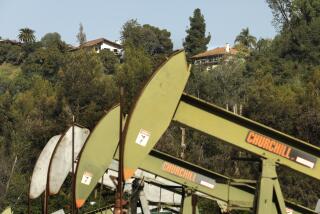Bush Urged to Ban Monterey Bay Drilling : Resources: Oil and gas exploration in the marine sanctuary is being discussed by the Administration, Rep. Panetta says. He calls it ‘nuts.’
WASHINGTON — The Bush Administration is debating whether to allow oil and gas drilling in the newly established Monterey Bay national marine sanctuary, Rep. Leon Panetta (D-Carmel Valley) charged Monday.
“I think it’s nuts,” Panetta said at a news conference where he appealed to President Bush to support a ban on oil-gas exploration or development in the highly sensitive waters, which includes parts of the Big Sur coastline and breeding areas for seals and sea lions.
Congress passed legislation in 1988, signed into law by then-President Ronald Reagan, requiring the designation of Monterey Bay as a sanctuary and setting a Dec. 31, 1989, deadline for the executive branch to issue regulations for its use.
The National Oceanic and Atmospheric Administration proposed a ban on oil and gas drilling as part of the proposed regulations, Panetta said, but the departments of energy and interior objected.
As a result, the regulations have been delayed two months beyond the deadline set by Congress and, Panetta said, raise the possibility that oil and gas development may be allowed if there is nothing to forbid it in the federal rules for Monterey Bay.
In a telegram to the President, the California lawmaker said: “Should the decision of your Administration be to allow new drilling within a designated marine sanctuary, this would constitute a major reversal of policies protecting sanctuaries and a major violation of your own stated commitment to protecting sensitive areas of our coastline.”
Alluding to former Interior Secretary James Watt, known for his pro-industry outlook, Panetta added: “If we got back to business as usual, as it was under the Watt Administration, I think people (in California) will feel double-crossed.”
An environmental group, the Center for Marine Conservation, joined in the criticism of the Bush Administration for postponing the issuance of a draft environmental impact statement and management plan for the Monterey Bay sanctuary.
“These new delays suggest a covert attempt to weaken protection against oil and gas development within Monterey Bay,” said Jack Sobel, an official of the center. “This raises serious questions . . . of whether the (oil) industry’s influence is subverting the public process in designating national marine sanctuaries.”
In Los Angeles, Jean-Michel Cousteau of the Cousteau Society said oil drilling in Monterey Bay “really makes no sense . . . in light of the problems we’ve had recently.”
“We know very well that we are not technologically equipped to face oil spills without major damage to the environment,” Cousteau said.
“I am for the concept of access in case of national defense needs,” he said. “But until then, we’d be much better off buying the oil from wherever we can get it and preserving those finite resources that are dwindling in this country.”
Panetta said Bush’s decision on Monterey Bay would send a signal on another issue--whether to allow oil-gas development in two other areas off the California coast on the Outer Continental Shelf.
The news conference was called before the President departs Wednesday for a trip to California. Bush has been asked to announce his decision on development of Outer Continental Shelf areas off the Northern and Southern California coasts during his trip this week. Administration sources, however, said White House Chief of Staff John H. Sununu had requested additional information from federal agencies on the issue and that an announcement of the drilling policy will be delayed.
Meanwhile, California Gov. George Deukmejian, here for a national governors’ conference, criticized members of California’s congressional delegation who have successfully held off drilling in vast areas under state jurisdiction with a series of legislated moratoriums.
Moratoriums, he said, serve not only to prevent drilling but also prevent the kind of studies necessary for responsible development of oil and gas resources in the future.
“When you have a moratorium, and you have an all-out ban, you are not going to have any studies,” Deukmejian told reporters. “And then a few years from now, if we have another energy crisis where we want to get every bit of oil and gas within our own jurisdiction developed, then we are not going to have the benefit of the studies, and the outcome will be that we will go forward hastily and that’s the time when you can do great environmental damage.”
Sen. Pete Wilson (R-Calif.), the likely GOP candidate for governor this year, disagreed with his fellow Republican on the issue, however.
“I’ll be willing to make him (Deukmejian) a small bet--we’ve been able to prevent drilling for a long time now and, if anything, recent events such as the Exxon Valdez and Huntington Beach oil spills have shown it’s just not worth the risk,” Wilson said.
Asked about the governor’s remarks, Panetta said that he and others who supported the moratoriums favored a balanced approach to oil drilling.
Times environmental writer Larry Stammer in Los Angeles contributed to this report.
More to Read
Sign up for Essential California
The most important California stories and recommendations in your inbox every morning.
You may occasionally receive promotional content from the Los Angeles Times.










